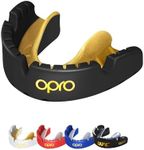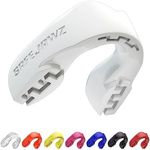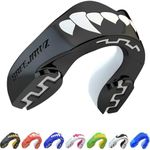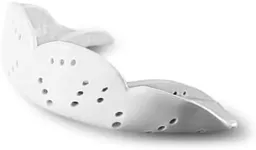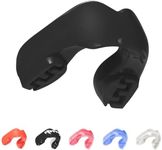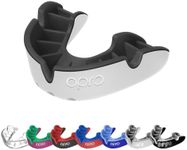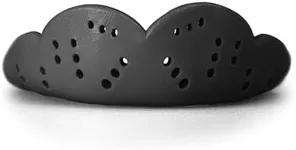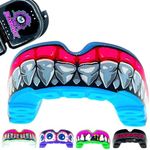Buying Guide for the Best Mouthguards
Choosing the right mouthguard is essential for protecting your teeth and mouth during sports or other activities that could result in injury. A good mouthguard should fit well, be comfortable, and provide adequate protection. When selecting a mouthguard, consider the type of activity you will be using it for, the level of protection you need, and any personal preferences you may have regarding fit and comfort. It's important to understand the key specifications of mouthguards to make an informed decision.TypeMouthguards come in three main types: stock, boil-and-bite, and custom-fitted. Stock mouthguards are pre-formed and ready to wear, but they often don't fit well and can be uncomfortable. Boil-and-bite mouthguards are softened in hot water and then molded to fit your teeth, offering a better fit than stock options. Custom-fitted mouthguards are made by a dentist to fit your mouth perfectly, providing the best fit and protection. Consider the level of comfort and protection you need when choosing the type. For casual or low-impact activities, a boil-and-bite might suffice, but for high-impact sports, a custom-fitted option is often recommended.
MaterialMouthguards are typically made from materials like EVA (ethylene vinyl acetate) or medical-grade silicone. EVA is common in boil-and-bite and custom-fitted mouthguards due to its moldability and shock absorption properties. Silicone is often used in stock mouthguards for its flexibility and comfort. The material affects the mouthguard's durability, comfort, and protection level. If you need a mouthguard for high-impact sports, look for one made from durable, shock-absorbing materials like EVA. For comfort, especially if you have sensitive gums, a softer material like silicone might be preferable.
ThicknessThe thickness of a mouthguard can influence its protective capabilities and comfort. Thicker mouthguards generally offer more protection as they can absorb more impact, but they may also be bulkier and less comfortable. Thinner mouthguards are more comfortable and easier to wear, but they might not provide as much protection. If you're involved in high-contact sports, a thicker mouthguard is advisable for better protection. For less intense activities, a thinner mouthguard might be sufficient and more comfortable for prolonged use.
FitA well-fitting mouthguard is crucial for both comfort and protection. A mouthguard that fits properly will stay in place and allow you to speak and breathe easily. Poorly fitting mouthguards can be uncomfortable and may not provide adequate protection. To ensure a good fit, consider a boil-and-bite or custom-fitted mouthguard, as these can be molded to your teeth. If you have braces or other dental appliances, a custom-fitted mouthguard is often the best choice to accommodate your specific dental structure.
BreathabilityBreathability refers to how easily you can breathe while wearing the mouthguard. This is particularly important during physical activities where you need to maintain a steady airflow. Mouthguards with good breathability will have channels or vents that allow air to pass through easily. When choosing a mouthguard, consider how it affects your ability to breathe, especially if you engage in high-intensity sports. A mouthguard that restricts breathing can be uncomfortable and may hinder performance.


